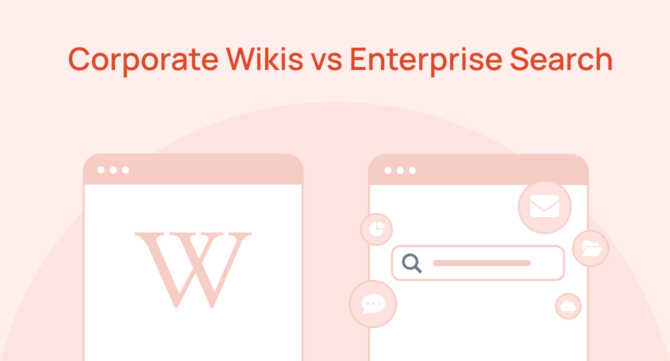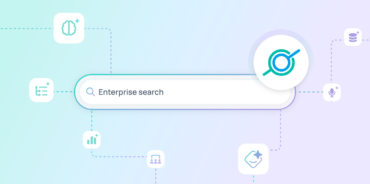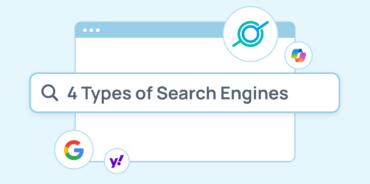What Is a Corporate Wiki?
A corporate wiki is a collaborative internal website where employees can create, edit, and organize company knowledge in real time. Inspired by platforms like Wikipedia, a company wiki provides a dynamic, user-friendly space for knowledge sharing across teams. It enables employees to document processes, policies, best practices, and project details, making it a vital component of a modern knowledge management system.
Corporate wikis serve as a single source of truth by centralizing company knowledge into an easily accessible format. They help reduce duplicated efforts, close content gaps, and ensure that every employee—from new hires to seasoned experts—can find up-to-date company information when they need it.
Why Do Companies Use Internal Wikis?
Internal wikis offer significant benefits to organizations looking to streamline communication, documentation, and decision-making. Here’s why companies use corporate wikis:
- Centralized Information: Teams store all company information in one place, ensuring everyone is working from the same knowledge base.
- Real-Time Collaboration: Wikis allow multiple users to contribute, edit, and update content in real time, promoting collaborative knowledge sharing.
- Improved Onboarding: New employees can access all relevant documentation and FAQs in one user-friendly location.
- Content Ownership: Teams take responsibility for updating their own content, reducing bottlenecks and ensuring accuracy.
However, while internal wikis are useful, they may not always be the best fit for every organization, especially as teams grow and information becomes scattered across multiple platforms. That’s where enterprise search comes in.
What Is Enterprise Search?
Enterprise search is a technology that enables users to search across multiple internal data repositories—from cloud storage and internal wikis to communication tools like Slack or ticketing platforms like Zendesk. Unlike a traditional corporate wiki, enterprise search does not require all data to live in a single location. Instead, it pulls information from across the tech stack and presents it in a unified search experience.
These tools often use AI-powered search features such as natural language processing, machine learning, and contextual understanding to provide accurate and relevant results. The goal is to make organizational knowledge as accessible and actionable as possible.

Corporate Wiki vs Knowledge Base vs Enterprise Search
Before diving into the pros and cons, it’s helpful to understand the difference between these commonly used knowledge management tools:
- Corporate Wiki: A collaborative space where team members can create and edit content. Best for real-time, shared knowledge.
- Knowledge Base: A more structured, often curated, repository of information. Best for official documentation and support articles.
- Enterprise Search: A tool that connects all platforms and makes all information across your organization easily searchable.
Each tool has a place in the modern workplace. Many organizations use them in tandem to build a complete knowledge management system.
Comparison: Corporate Wikis vs Enterprise Search
| Feature | Corporate Wikis | Enterprise Search |
| Purpose | Collaborative knowledge sharing | Comprehensive knowledge retrieval and discovery |
| Data Sources | Limited to wiki content | Multiple internal repositories |
| Search Functionality | Basic keyword search | Advanced, contextual, and AI-powered search |
| Real-Time Updates | Yes | Varies by tool |
| User Interface | Wiki-style pages | Search engine and AI chatbot interface |
| Integration | Limited | Broad integrations with third-party tools |
| Knowledge Management | Static and manual updates | Automated, distributed, and AI-enhanced |
Where Corporate Wikis Fall Short
While corporate wikis are effective for internal documentation, they do have limitations:
- Siloed Information: They only index their own content. If your organization uses multiple tools, your wiki becomes just one of many places where knowledge lives.
- Limited Search: Basic search capabilities can make it hard to find specific information, especially as the wiki grows.
- Maintenance Required: Wikis require active maintenance to remain current. Outdated content can lead to misinformation.
- Lack of Context: Wikis don’t connect the dots between different tools or data sources.
These limitations are magnified as organizations scale, adopt more tools, and accumulate more organizational knowledge.
Advantages of Enterprise Search
Enterprise search platforms solve many of the challenges associated with traditional corporate wikis:
- Advanced Search Functionality: Tools use AI to interpret natural language, making search results more relevant.
- Integration Across the Stack: Access files, messages, documents, and records across platforms like Google Drive, Slack, Confluence, HubSpot, and more.
- Real-Time Results: Some tools provide immediate indexing and access to new content.
- Security and Compliance: Fine-tuned permission controls ensure sensitive data is only accessible to authorized users.
- Actionable Analytics: Track what people are searching for and identify content gaps in your knowledge base.
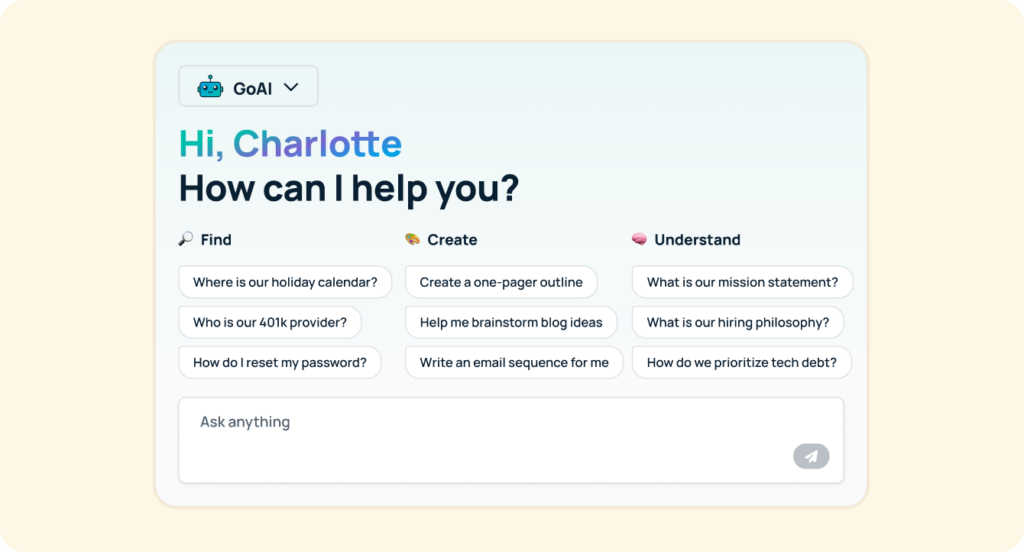
When to Use Corporate Wikis, Enterprise Search—Or Both
Corporate wikis and enterprise search each serve distinct roles in a modern knowledge management strategy. While they’re often viewed as alternatives, they are most effective when used together.
Wikis are best suited for creating, organizing, and storing structured documentation. They provide a centralized, collaborative space for teams to document recurring processes, guidelines, and resources. However, their utility is typically limited to the information stored within the wiki itself.
Enterprise search, by contrast, is designed to surface information across the entire organization—regardless of where that knowledge lives. These tools connect to multiple repositories, such as email, Slack, CRMs, support platforms, document drives, and more. Rather than requiring teams to move or recreate content in a centralized wiki, enterprise search makes everything discoverable from a single search bar.
If you’re considering migrating all your company’s documentation into a single wiki, it’s important to weigh the time and effort required. Manual consolidation can be a lengthy and resource-intensive process. In contrast, implementing enterprise search allows you to connect all your existing knowledge sources with minimal disruption, creating a more scalable and unified search experience.
For example, while a wiki might effectively organize team handbooks or how-to guides, it typically cannot access sales emails in HubSpot, support tickets in Zendesk, or project updates in Slack. Enterprise search can index and retrieve content from these platforms, offering visibility into knowledge that is otherwise siloed.
Use Enterprise Search If:
- Your company’s knowledge is distributed across many tools and platforms
- Employees often spend excessive time trying to find the right document or answer
- You want to reduce redundant work and increase operational efficiency
- You need a flexible, scalable knowledge management system that grows with your business
Best of Both Worlds
In practice, many organizations deploy both solutions. The corporate wiki functions as the hub for structured, editable content—like internal policies, training materials, and documented workflows. At the same time, enterprise search acts as the connective layer that surfaces knowledge from the wiki and every other platform in your digital ecosystem.
By combining these tools, you enable employees to both contribute to and discover information seamlessly. This hybrid approach ensures your organization has both well-maintained documentation and comprehensive, real-time access to all relevant company knowledge—no matter where it resides.
Popular Corporate Wiki Tools
Organizations can choose from a range of tools to build and maintain a corporate wiki, depending on their needs for collaboration, structure, and integration. Here are some widely adopted options:
- DokuWiki: A lightweight, open-source wiki software that stores data in plain text files and includes plugin support, access controls, and easy setup for documentation needs.
- Confluence: A collaborative documentation tool that offers real-time editing, customizable templates, and integration with project management tools.
- Notion: Combines note-taking, task tracking, and wiki functionality in a flexible, modular interface. Supports structured documents and databases.
- Slab: A streamlined knowledge management platform with built-in search capabilities and integrations with GitHub, Google Drive, and other common workplace tools.
- Tettra: Designed for internal team use, it supports integration with communication tools like Slack and Microsoft Teams to simplify sharing and content updates.
Popular Enterprise Search Tools
Enterprise search platforms offer robust capabilities for retrieving information from across an organization’s digital ecosystem. These tools typically support natural language processing, real-time indexing, and integration with a variety of data sources.
- Elasticsearch: A flexible, open-source search engine designed for developers building custom search and analytics solutions.
- GoSearch: Provides AI-powered natural language search, permission-aware access controls, and integration with tools like Google Drive, Notion, Confluence, Slack, HubSpot, and Zendesk. Includes a chat interface for AI-generated summaries and instant responses.
- Glean: Connects with a range of workplace applications and uses artificial intelligence to deliver personalized and contextually relevant results.
- Coveo: Offers a combination of enterprise search, recommendation engines, and analytics to help teams find and act on relevant information quickly.
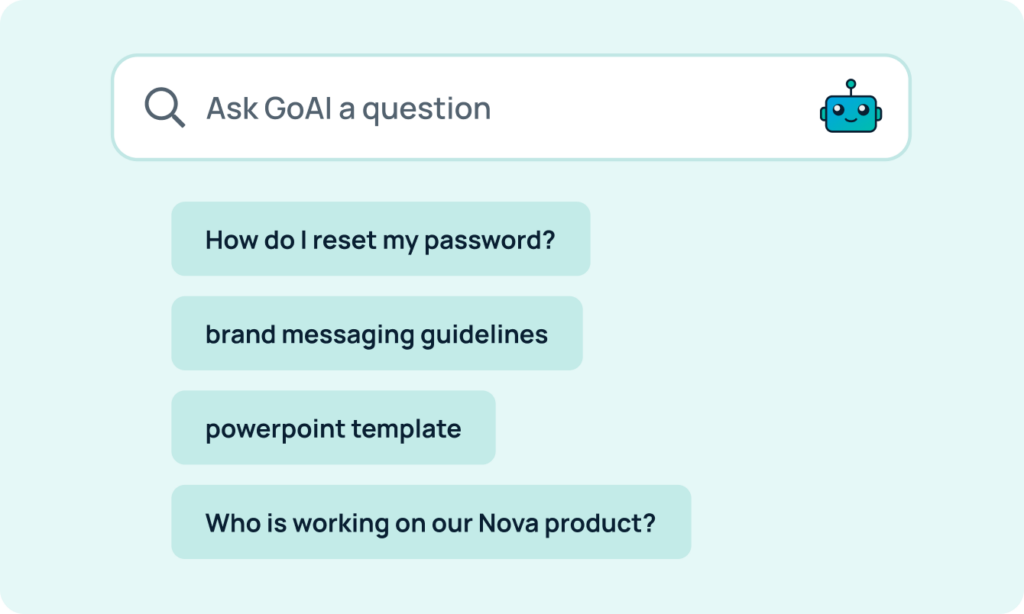
Building a Complete Knowledge Management Strategy
A successful knowledge management strategy requires more than just one tool—it involves a thoughtful combination of systems that work together to support how teams create, access, and use information. Rather than relying solely on a wiki or search engine, leading organizations develop integrated solutions that:
- Centralize company knowledge in a user-friendly corporate wiki to ensure consistent documentation and encourage collaboration.
- Provide real-time access to the latest resources, allowing teams to stay aligned and make timely decisions.
- Leverage enterprise search to surface relevant content from all connected repositories, including wikis, cloud drives, ticketing systems, and communication platforms.
- Identify and resolve content gaps by using analytics to understand what information employees are searching for—and where it might be missing.
- Promote seamless knowledge sharing across departments and tools, reducing silos and improving overall productivity.
By combining the strengths of both corporate wikis and enterprise search, companies can establish a scalable and sustainable knowledge management system that evolves with their workforce. This holistic approach empowers teams to spend less time looking for answers and more time delivering impact.
Why GoSearch Might Be the Missing Piece
While wikis are excellent for storing information, GoSearch transforms how your team discovers it. By unifying search across all your workplace apps, GoSearch eliminates information silos and dramatically improves team productivity.
Key benefits of GoSearch include:
- Natural language search for fast, relevant results
- Chat-based interface with AI-powered summaries
- Secure, permission-based access
- Deep integration across your tech stack
Whether you’re trying to find a specific document, recall a Slack conversation, or summarize a project stored in Notion, GoSearch helps you do it all from one search bar.
Start building a smarter, more connected workplace. Combine the collaborative power of a corporate wiki with the intelligence of enterprise search to unlock your team’s full potential.
Ready to see how GoSearch enhances your knowledge workflows? Schedule a demo today.
Search across all your apps for instant AI answers with GoSearch
Schedule a demo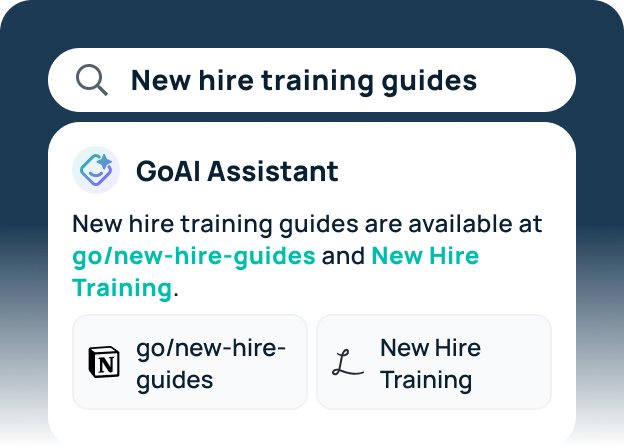
FAQs About Corporate Wikis and Enterprise Search
What is a corporate wiki?
A corporate wiki is a collaborative space where employees document and maintain company knowledge. It’s used for onboarding, SOPs, internal documentation, and more.
How is a corporate wiki different from a knowledge base?
A knowledge base is typically more structured and curated by designated contributors. A company wiki, by contrast, allows open editing and fosters collaboration.
Can you integrate a corporate wiki with enterprise search?
Yes. Tools like GoSearch can index content from popular corporate wikis like Confluence or Notion, making that content part of a larger, easily searchable knowledge ecosystem.
What’s the benefit of a single source of truth?
It ensures every employee has access to accurate, current company information, reducing inconsistencies and improving alignment across teams.
What should I look for in enterprise search tools?
Key features include:
- Advanced, contextual search functionality
- Broad integration with internal tools
- Security and compliance controls
- Support for real-time indexing
- Analytics for identifying content gaps
